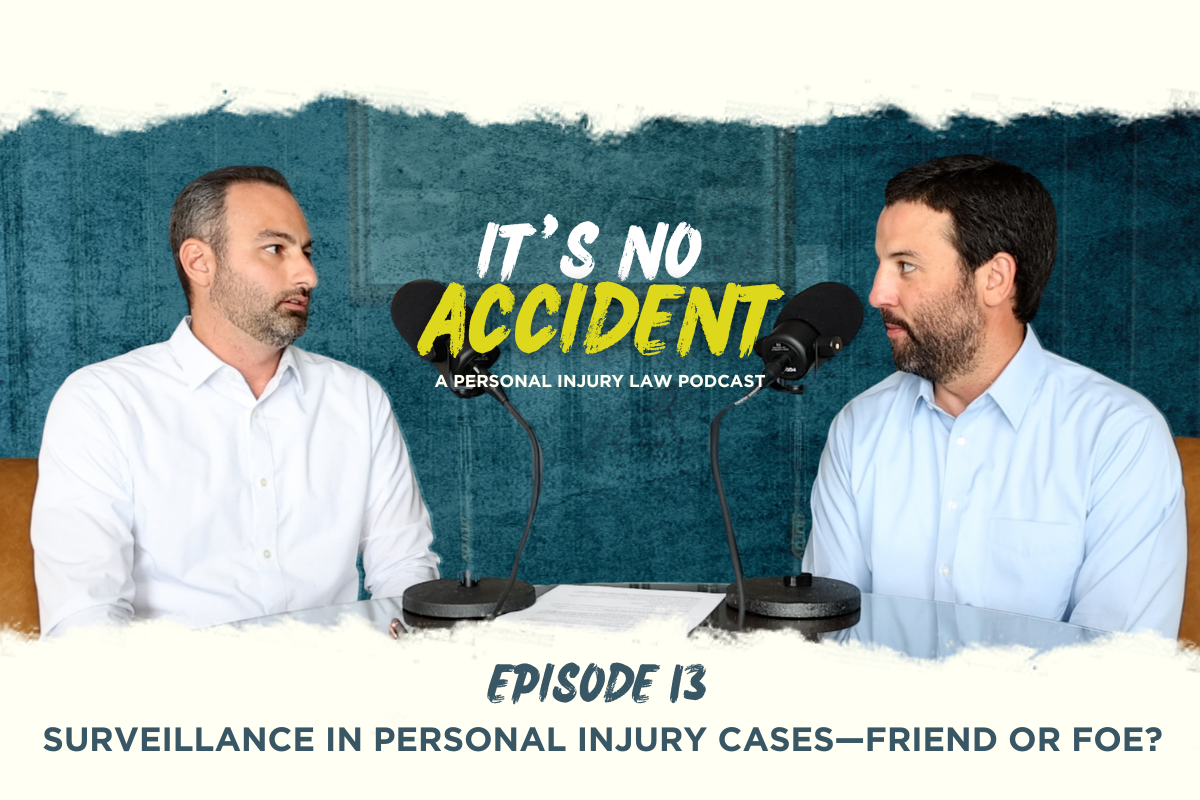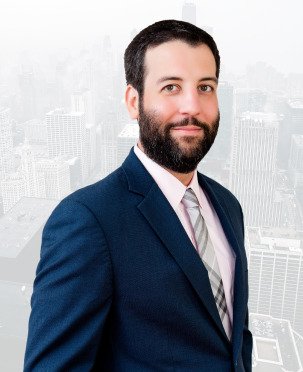
Podcast Description
In the latest episode of It’s No Accident, attorneys Mark Nonni and Jaeson Homola uncover the surprising realities of surveillance in personal injury cases. From insurance companies hiring private investigators to the strategic use of surveillance by plaintiffs’ attorneys, the discussion reveals how these tactics can sometimes help rather than hurt a claim. They explore real-world examples, including cases where defense surveillance footage backfired, ultimately supporting the plaintiff’s narrative.
Episode Transcript
Alright, one of the other things we want to talk about today is something that came up recently with a client. I had just signed this client up, and I got a phone call where he said, “I feel like there might be someone sitting outside my house. I keep seeing the same car over and over again.” What he was referring to was the suspicion of being followed by a private investigator, someone potentially watching his every move to try to undercut the claims he’s making in his case.
Have you seen that in your cases? I think everyone has a general idea of what private investigators do—a lot of times we hear about them in divorce cases—but do we see that in personal injury cases too?
Yes, I would say it comes up mostly when clients bring it up. Most of the time, it’s clients asking about it or worrying about it, more so than us actually confirming it’s happening.
I usually tell clients: Yes, insurance companies do hire private investigators. Auto insurance, liability insurers, even insurers for stores or in the workers’ comp world—they sometimes hire investigators to follow the injured person around and try to catch them doing something that contradicts their claims.
My advice is simple: assume it could be happening. But as long as you’re following your doctor’s orders and telling the truth, you shouldn’t have anything to worry about. They’re trying to catch you doing something you said you couldn’t do. For instance, if a doctor says you shouldn’t be riding a motorcycle and you’re caught on camera doing just that, it’s a problem. But if you’re honest and compliant, let them record you all day. It won’t matter.
I remember one case where a guy said he had a back injury and listed all the things he couldn’t do anymore in his deposition. Later, the private investigator caught him on a Sea-Doo—something he had essentially claimed he could no longer do. That can definitely hurt your case.
But surveillance doesn’t always go against the client. I had a case go to trial where the defense put surveillance video into evidence. I was shocked. We watched the video repeatedly, trying to figure out what we were missing. It showed my client walking upstairs, carrying her shoulder bag, and driving—all things she never said she couldn’t do. She had a lower back injury, but the video didn’t show anything that contradicted her claims.
Interestingly, in that case, there was also a dispute about whether she used her blinker before the crash. The defendant said she didn’t use it. My client insisted she always uses her blinker. The surveillance video actually showed her in a parking lot using her blinker before making a left turn—something most people wouldn’t do in that context. It helped our case, and we ended up getting a good verdict.
Private investigators do show up, but maybe in about 10% of cases. And they might be involved more often—we just don’t always see the results. The only way we usually find out about surveillance is if a lawsuit has been filed. Many cases settle before that, so the existence of surveillance video may never be revealed.
Even once a lawsuit is filed, you may not know right away. It often comes up when you’re nearing trial. Sometimes the defense doesn’t want to use the video because it shows nothing incriminating or even helps our case. If you’re doing proper discovery, you may be able to force them to hand it over.
In fact, I know of cases where the surveillance video just shows the plaintiff struggling through daily life—something that ends up helping us. In those cases, the defense unintentionally hands us a “day in the life” video showing how difficult life is for our client.
When that happens, we can use the investigator’s testimony to our advantage. We might put them on the stand and ask, “What did you see my client doing?” and they have to acknowledge everything that actually supports our case, despite being hired by the defense.
On our side, we also sometimes hire private investigators—especially in dram shop or liquor liability cases. These are fact-intensive cases where there are multiple versions of events. We use investigators to gather statements and conduct witness interviews.
Investigators are often more effective at getting people to talk than attorneys are. When approached by an attorney, witnesses sometimes get nervous. Investigators are typically good conversationalists who can put people at ease and gather information without being intimidating.
There’s also a legal technical reason we use them: attorneys can’t be witnesses. If I talk to a witness and they later say something different at trial, I can’t testify about that without stepping down as the attorney. But if the investigator gets the statement, they can be called as a witness if needed.
We also try to get recorded statements, so if a witness changes their story, we have something to hold them accountable. Defense attorneys can attack us for using leading questions, but with investigators, it’s harder to make that argument. They’re seen as more neutral, just gathering facts.
In many cases, some of the best investigators are former law enforcement officers or detectives. They’re experienced, know how to talk to people, and often know how to find crucial information that can make a big difference in the case.


